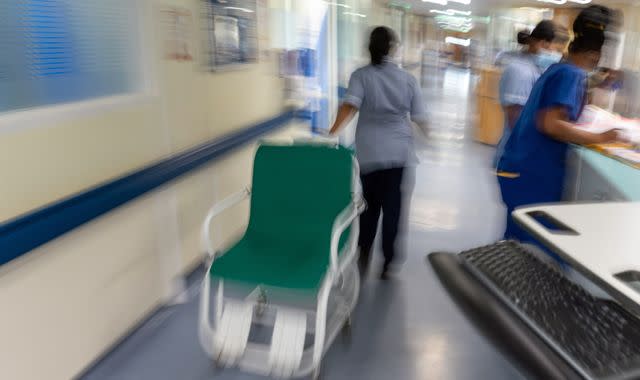NHS waiting list 'could reach 8 million by next summer' even if there are no further strikes, report warns

The NHS waiting list could reach 8 million by next summer regardless of whether strike action continues, according to new research.
In a stark warning, the Health Foundation found that the waiting list could reach the record figure by August 2024 if there is no more strike action by healthcare workers before starting to come down.
If strikes were to continue, the list could be 180,000 higher, it said.
The new report by the independent charity came to the 8 million figure after it modelled four different scenarios using current trends.
It comes after it was revealed that 7.75 million people were waiting for NHS treatment as of August - the highest figure since records began in 2007.
Charles Tallack, director of data analytics at the Health Foundation, said: "Behind these numbers are people anxious for a diagnosis, patients in avoidable pain and lives put on hold.
Politics latest: MP told to stay away from parliament after being arrested on suspicion of rape
"While industrial action has a range of impacts on NHS organisations, the strikes have only directly resulted in a small increase in the size of the overall waiting list.
"Ministers have been quick to blame industrial action for the lack of progress in reducing the waiting list but the roots of this crisis lie in a decade of underinvestment in the NHS, a failure to address chronic staff shortages and the longstanding neglect of social care."
The government has blamed ongoing strikes for rising waiting times in the NHS and said industrial action "needs to end".
Different groups of healthcare workers have been striking since December 2022 - including nurses, radiographers, ambulance drivers and medics - with the action impacting more than one million appointments.
The strikes escalated last month after junior doctors and consultants went on strike together for the first time, followed by three days of co-ordinated action in early October.
The British Medical Association (BMA) has said consultants will hold off calling more strikes until November to give time for negotiations with the government, while the junior doctors' committee at the BMA said it had also agreed to talks with the government next week - but the latter has said pay will "not be on the table".
The Health Foundation's analysis only takes into account the disruption caused by the junior doctor and consultant strikes.
Tim Mitchell, president of the Royal College of Surgeons of England, described the Health Foundation's figures as "sobering".
"Waiting lists have ballooned over the past decade due to underinvestment and workforce shortages," he said.
"The COVID-19 pandemic has exacerbated these pressures.
"While industrial action has contributed to delays, the roots of this crisis precede the strikes."
Saffron Cordery, deputy chief executive at NHS Providers, said the report "will fuel trust leaders' concerns that the record-high waiting list will keep growing before it comes down".
"The projected increase alongside the rising financial impact of industrial action underscores the urgency of resolving the strikes," she said.
"While strikes are not the leading cause of longer waits, the report confirms they exacerbate the issue by swallowing up NHS resources that could be better spent on cutting care backlogs."
Click to subscribe to Politics at Jack and Sam's wherever you get your podcasts
An NHS spokesperson said: "While the analysis itself acknowledges that the impact of strikes is significantly underestimated and NHS staff and patients won't agree that the impact has been small - with more than one million appointments and procedures rescheduled - there has continued to be important progress in bringing down the longest waits.
"Two-year waits have been virtually eliminated and waits of more than 65 weeks have more than halved.
"The NHS is seeing high levels of demand, with more people coming forwarding for the care they need and referrals increasing at an even higher rate than before the pandemic, which is why our elective recovery plan and tools like community diagnostic centres, surgical hubs, and technology like robots and AI are essential to tackling the backlog and ensuring everyone gets the care they need as quickly as possible."
Read more:
NHS patients still face postcode lottery for urgent care, damning MPs' report finds
'I've lost control of my birth': Caesarean sections delayed due to NHS strike
A Department of Health and Social Care spokesperson said: "Cutting waiting lists is one of the government's top five priorities and we are taking action to shorten long waits, despite disruption from strikes.
"We have reduced 18-month waits by more than 90% since their peak in September 2021, and we have opened 127 community diagnostic centres across the country to offer quicker, more convenient checks outside of hospitals for conditions such as cancer and lung disease - with over 5 million additional tests so far delivered.
"We are maximising all available capacity by drawing on the independent sector, as set out by our elective recovery taskforce to give patients more control over where they receive their care so they can be treated more quickly."


